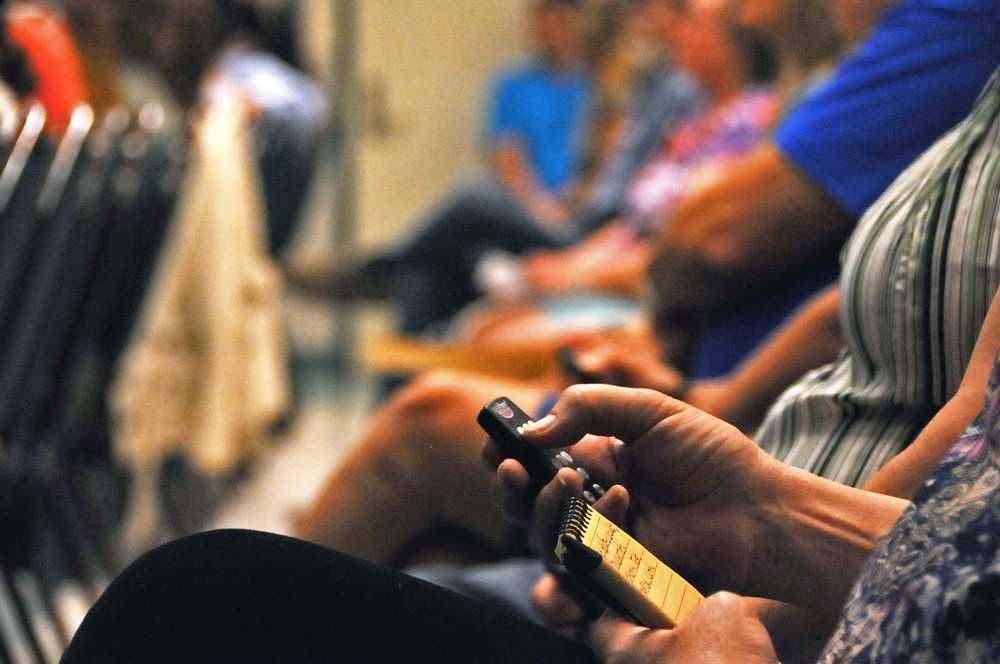Talking about the heroin addiction problem is simpler than identifying solutions.
However, that is where a crowd of Kenai Peninsula residents started Thursday night at the Challenger Learning Center of Alaska in Kenai. The second Heroin Epidemic on the Kenai town hall event drew a crowd, ranging from police officers in uniform to doctors in jeans to concerned grandmothers, who used every chair that the Challenger Learning Center had.
Last week’s event, the first installment of two meetings focusing on the rise of heroin addiction on the Kenai Peninsula, introduced the broad problem. This Thursday’s event stepped forward into specifically asking community members for solutions.
Shari Conner, one of the event’s organizers through the community coalition Change 4 the Kenai, said organizers collected the feedback from last week’s event and identified commonly mentioned community needs, such as a detox facility and further education.
“If you just Google ‘Heroin Task Force,’ you’ll come up with community after community that has the same problem,” Conner said. “Instead of reinventing the wheel, we need to look at what other people are doing. They’re about two years ahead of us.”
Approximately 83 percent of the attendees at the first meeting said they knew someone who misuses prescription pain pills; approximately 76 percent said they knew someone who used heroin, according to the Change 4 the Kenai’s poll results. On Thursday, the questions buckled down to a few more specifics, asking attendees if they knew whether particular pills were painkillers or not. Most attendees correctly identified pills such as Oxycontin, Hydrocodone and methadone.
After the initial survey was taken, speakers from a guest panel stepped up to start the conversation about solutions.
Many attendees at May 19 mentioned the need for a needle exchange in the Kenai area. Rebecca Morrissey, the HIV prevention and education coordinator with the Alaskan AIDS Assistance Association in Anchorage, discussed the nonprofit’s clean syringe exchange program with the attendees.
More than 11,000 individuals came into the exchange for the office last year, with an average of 90 new people that come in each month. She said the program, which operates in Anchorage and Juneau, costs approximately $80,000 to operate annually.
“[That cost] seems like a lot until you consider what it takes to treat one individual for Hepatitis C,” Morrissey said. “Just the medication alone is $81,000 for the cure for Hepatitis C.”
At first, the needle exchange met with opposition. Some in the crowd said they thought it enabled heroin addicts to continue their behavior. Others who supported it said it was better to provide the clean needles to prevent the spread of disease.
Morrissey referenced a situation in Indiana in 2015 when needle sharing was connected to the spread of HIV in the state. The state’s public health department received reports of more than 170 cases of HIV, she said. The state responded by initiating more needle exchange programs, she said.
Dr. Kristie Sellers, director of behavioral health at Central Peninsula Hospital in Soldotna, presented the concept of “intermediate variables,” or things that the community can influence its members to alleviate heroin use. She listed four variables: access to and availability of drugs in the community, knowledge of associated health risks, community norms and problem monitoring.
“We can’t wish this problem away,” Sellers said. “We can’t incarcerate this problem away. We’ve tried. But there are some things we can do.”
The crowd broke up into focus groups to discuss the intermediate variables Sellers mentioned, debating the best ways to impact those variables. Many participants in all four groups mentioned a similar weakness in the community — cooperation, coordination and communication in light of the independent Alaskan mindset.
That being said, some attitudes did change. At first, many people in the focus groups seemed to oppose a needle exchange in the community. By the time the organizers polled the crowd for a second time at the end of the meeting, 96 percent of the attendees said they supported a needle exchange.
Tayler Matthews, who works with Serenity House at Central Peninsula Hospital and volunteered at the event, said she was pleased with the change in support.
“We were very surprised at how accepting people were of the needle exchange,” Matthews said.
Other groups discussed the need to change community norms and provide support for those coming through recovery. Audrey Marvin, who shared her story about recovering from addiction at the forum, said she felt very ostracized by the community while she was addicted.
“A lot of the things you see on the (Facebook) pages … is really hurtful,” Marvin said to the crowd. “It wasn’t ‘us’ anymore — it was ‘them’ and ‘us.’”
Marvin is also working to establish a housing project for those in recovery called the Indigo Housing Project. She said while she was in recovery, she saw the need for more readily available housing for those trying to stay clean. A masquerade ball, held at the Soldotna Regional Sports Complex on June 25, will raise funds to help get the project started, she said.
The next step to find solutions to the heroin epidemic is to keep the conversation going, said Finnley M’Kenna, one of the organizers with Change 4 the Kenai. The feedback at the meeting has been helpful, but the community needs to stay involved to truly solve the problem, she said.
“We need to come up with what the community wants … and (take) steps down from there to where we can start,” M’Kenna said. “And continue to engage in the conversation. We have to continue to talk about it.”
Reach Elizabeth Earl at elizabeth.earl@peninsulaclarion.com.

